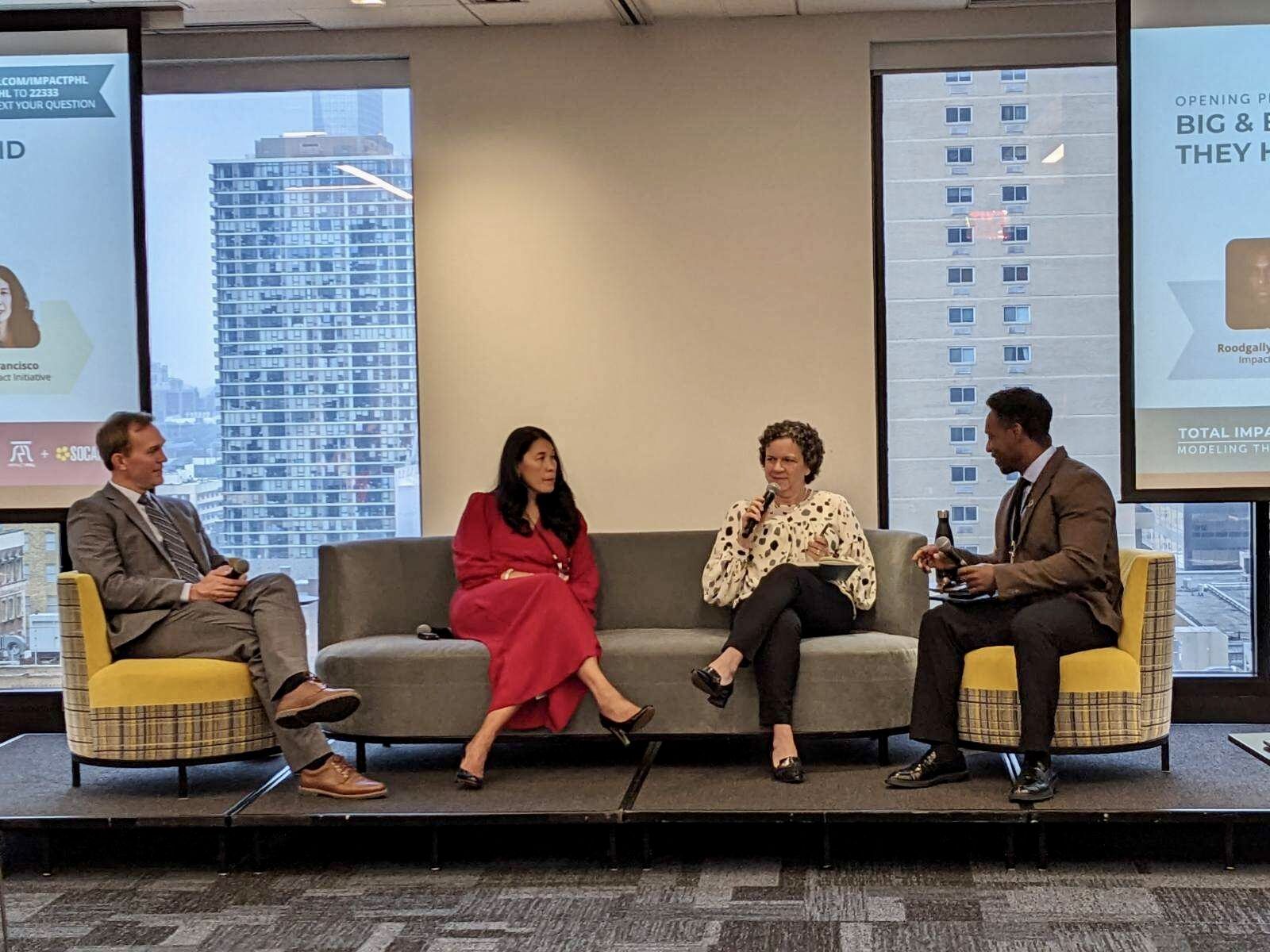TGIF, Agents of Impact!
Beyond borders. If you had the TV on while reading ImpactAlpha this week, the split screen was stark. On cable, the U.S. southern border was in crisis; foreign aid was under threat. In The Brief, entrepreneurs and investors in Mexico and Central America were building businesses to teach coding to low-income women, provide water filters (see No. 2, below) and restore dilapidated housing (No. 4). Our series of video interviews with Agents of Impact in Latin America continues next week.
When political rhetoric goes low, Agents of Impact go high. Impact entrepreneurs are optimizing for inclusion over exclusion. Instead of walls, impact investors are building bridges to Latin American markets for quality, affordable healthcare, education, food and energy. Mexican fintech startups eye the U.S.’s growing Latino market. Impact investments are not enough to restore security in fragile regions. But expanded access to services, improved livelihoods and healthier ecosystems make communities more resilient. The growing market in services for migrants and refugees reflects the still unmet challenges of shared prosperity and sustainable development for those that stay home. Short hate; go long on empathy. Turn down the noise and turn up the impact alpha.
—David Bank, editor and CEO
Advisor advisory. “When you can talk about impact, it changes how your clients will remember the meeting,” says one financial advisor. “You develop a deeper client relationship when you talk about things that are more memorable.” Financial advisors will share their secrets on ImpactAlpha’s Agents of Impact Call No. 8, “Sustainable investing advice – for financial advisors.” Special guests include The Investment Integration Project’s William Burckart, Morgan Stanley’s Noel Pacarro Brown, State Street’s Brie Williams and Mark Sloss of Regenerative Investment Strategies. Join The Call, Thursday, April 18 at 1 pm ET / 10 am PT / 5 pm London. RSVP today.
Featured: The Brief’s Big 7
- Risk, adjusted: Will financial markets reprice climate risk gradually – or all of a sudden? This is the year climate risk hits financial markets, we declared in a podcast at the start of the year. And so it is, as climate-change scenarios are affecting insurance premiums, debt ratings and portfolio allocations. Accumulating data suggest markets have mispriced climate risk – and a correction is coming. Most clear are increasing “physical risks,” from floods, hurricanes, rising seas, crop failures and other climate-related effects. Less certain are “transition risks” to companies as climate realities force change, both voluntary and mandatory. BlackRock, the world’s largest asset manager, documented the gap in municipal bonds, commercial real estate and U.S. utility stocks. Mercer warns investors’ portfolios may get a jolt from sudden “repricing events” that recalibrate the risks of climate change. That will shake out investors who haven’t optimized for the low-carbon transition. Conversely, Mercer suggests, a “low-carbon transition premium” is available to those who invest in climate mitigation and adaptation. Dive in.
- Low-carbon diet. Big Food is pushing for climate action. Danone, Mars, Nestlé, Unilever and the Sustainable Food Policy Alliance urged U.S. lawmakers to adopt climate policies. “We have a business imperative to reduce emissions,” the companies said.
- You heard it here. “Climate risk hits the market and other impact investing trends to watch in 2019.” Podcast.
- Impact en las Americas. Our video interviews from the Foro Latinoamericano de Inversión de Impacto, or FLII, are snapshots of the progress and maturity of impact investing in the region. (Thanks to Disruptivo.tv for help in producing the series.) Watch for more videos next week.
- Pomona Impact is investing in Central America from Central America. Deploying mezzanine debt as well as equity enables Pomona to recoup capital without an acquisition or IPO. “More capital will flow to the region if we do our job well,” says co-founder Rich Ambrose. Watch.
- Laboratoria’s coding bootcamps boost livelihoods for low-income women. Many Latin American youths lack the skills they need to succeed in an increasingly digital world. So do many companies in Latin America. “We saw [an] incredible opportunity to identify talented young women who don’t have access to university education, teach them to program, and then connect them into these teams, so they can contribute to a more inclusive digital economy,” Laboratoria’s Gabriela Rocha said. Watch.
- Angel Ventures is seeding startups in Mexico, Colombia, Peru and Chile. “The region is changing dramatically,” says founder Hernán Fernández, who has gathered 400 angel investors across countries of the Pacific Alliance. The firm invested in 21 companies from its first, $20 million venture fund. The target for Fund II: $120 million. “Bringing goods and services to the unbanked population is a massive opportunity,” Fernández says. Watch.
- Agent of Impact: Hiro Mizuno. As chief investment officer of the $1.5 trillion Government Pension Investment Fund of Japan, the world’s largest pension fund, Mizuno has leverage. He has used it to drive sustainable investing in Japan and throughout global financial markets. Shortly after Mizuno took the helm in 2015, the GPIF signed on to the UN Principles of Responsible Investment. Partly as a result, sustainable investing assets in Japan leaped from 3% to 18% of total managed assets between 2016 and 2018, according to the Global Sustainable Investment Alliance. “We have a 25-year investment horizon,” Mizuno said in 2017. “The financial system has to be sustainable. It’s important for us to make sure we affect the whole investment chain.”
GPIF invests its trillions through the world’s biggest asset managers, including Prudential, State Street, JP Morgan, BNP Paribas, Goldman Sachs, BlackRock and Fidelity. He presses asset managers to think long-term. He requires them to sign on to the Principles for Responsible Investing, or explain why they won’t. He expects them to integrate environmental, social and governance, or ESG, considerations into their investment decisions. And he wants passive managers to engage companies on ESG issues. Mizuno uses technology and artificial intelligence to track managers in real-time. “If you do not satisfy us then you are out,” he told the London Stock Exchange last year. Follow ImpactAlpha on Instagram.
- Follow the talent with ImpactAlpha’s weekly report on career moves, job openings, events and opportunities.
- Deals of the week. Stay on top of the dealflow all week long on ImpactAlpha.com. Some deals that stood out:
- Deeper dive: Make School’s pay-as-you-earn degree program for undergraduates. Make School isn’t another coding bootcamp, explains Venrock’s Tom Willerer. “What helps you get a job is technical. But what makes you succeed once you’re there is the critical thinking that comes with a liberal arts emphasis.” Make School focuses on both. Venrock led Make School’s $15 million Series B financing. The full story.
- Farmer finance. Proximity Finance raises $10 million in debt to expand farmer lending in Myanmar… AgDevCo’s third investment in Rwandan agribusiness is a loan to maize mill Minimex.
- Inclusive fintech. Branch raises $170 million to drive access to credit in emerging markets… Brazil’s Weel raises $30 million from Franklin Templeton to support small-business lending.
- Access to housing. Adobe Capital exits, and IGNIA partially exits, Mexican home rehab startup Provive… Landed scores $7.5 million to help teachers buy homes.
- The Bay Area’s workforce housing opportunity. Real estate firm M31 Capital launched a $25 million Opportunity Fund to turn vacant and underutilized apartment and mixed-use properties into entry-level workforce housing for the San Francisco Bay Area. “Totally love the mission,” tweeted Caprock’s Mathew Weatherly-White. “But is there even $25 million worth of vacant and underutilized housing opportunities in the Bay Area?” We asked M31 Capital’s Taylor Lembi. “Unfortunately, there is.” Properties can become so run down, owners can’t afford to rent or restore them, he says. “Given the price of property in the Bay Area and the Opportunity Zone requirement for capital expenditure, this investment strategy amounts to five to six buildings.”
- Have your own questions? Drop us a line at [email protected], or on our Slack channel, and we’ll try to get answers.
- Revenues make blended-finance deals go ‘round. Blended finance is not (yet) realizing its full promise, development consultants from Dalberg wrote on ImpactAlpha in February. Every dollar of public funding used in blended finance, they showed, generates only 79 cents of private capital. Dalberg’s recommendation: “Base more deals on project revenues rather than repayments from governments.” Joan Larrea of Convergence (a Dalberg spinoff) reinforced the point this week in a guest post on ImpactAlpha. “To put it bluntly, if you want investors, you have to present a revenue line,” she wrote. The formula works: Customer revenues have made the off-grid solar market, launched with deeply concessional financing, increasingly investable. “Let’s keep it real,” says Larrea. “And let’s accept that attracting new capital into some sectors is hard, it will be incremental, and none of us has any magic wands.” Read on.
7. On the scene at the 2019 Skoll World Forum. ImpactAlpha’s Zuleyma Bebell is in Oxford, England for the annual gathering of social entrepreneurs. And the winners of the $1.5 million Skoll Awards are… Harambee, which is combatting South Africa’s high youth unemployment by helping companies recruit and train entry-level talent; Crisis Text Line, which connects people with mental health crises to a volunteer help network; mPharma, which is helping stabilize drug prices in Africa by preventing the over- or under-stocking of drugs; Thorn, Demi Moore and Ashton Kusher’s foundation, which deploys tech tools to prevent childrens’ sexual abuse and sex trafficking; and mPedigree, which combats counterfeit drugs and seeds with verifiable, single-use identification markers. This year’s awards were presented by last year’s winners: VisionSpring, Girls Not Brides, myAgro, Polaris and Global Witness. More from Skoll next week.
— April 12, 2019.











